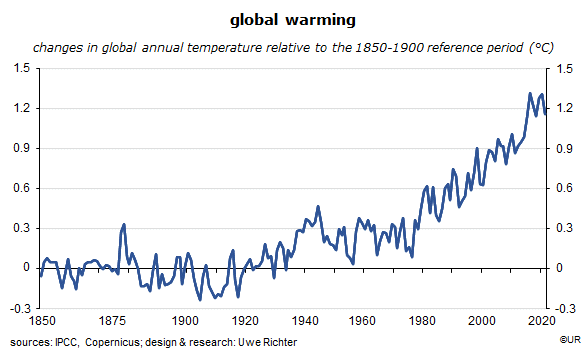
Market Commentary: CO2 emissions: rapid increase continues, no change in sight
Dieter Wermuth, Economist and Partner at Wermuth Asset Management
Once a year, oil major BP publishes its Statistical Review of World Energy. Now in its seventy-first edition, it is an essential document for people who want to learn about the state of the world’s climate and the main trends that determine its future.
One of the many tables covers CO2 emissions: they are increasing rapidly again, after a 5.6% y/y reduction in recession year 2020 and have in the meantime probably reached the record levels of 2019, or 39.2 billion tons. The world continues to race toward ever-higher temperatures and a climate catastrophe.

The trend of global CO2 emissions had a slope of 0.7% per year over the past decade. Emissions have been declining in the rich countries of the West at rates of 1.8% in Europe (in Germany, France, Italy and Spain by about 2% each) and 0.9% in North America but have been rising in the poorer rest of the world: Asia-Pacific +1.8%, former Soviet Union +0.7%, Middle East +1.8% and Africa +1.5%. According to BP, these regions presently account for 70.2% of the world’s CO2 emissions.
The catching-up process of emerging economies is accompanied by rising fossil fuel consumption. This is not about to stop any time soon. Increasing standards of living are highly correlated with the use of natural resources and the destruction of the environment. China is worst: it is responsible for 30.9% of the world’s CO2 emissions – over the past five years these had increased at average annual rates of no less than 2.7%.
BP also publishes some detailed statistics about renewable energies. They are the future. Over the past ten years, consumption of energy from wind, solar and bio has expanded at an average annual rate of 12.8% and thus faster than any other source of energy. Even so, their share in global primary energy consumption is still only 6.7%. Coal, oil and gas account for 82.3%. The share of those fossil fuels goes down, but only slowly, by about one percentage point per year – which shows that the energy transition will take a lot of time. As far as the climate is concerned, things will get worse before they get better.
Note that the scope for the expansion of renewables has physical limits. It requires increasing amounts of land. This is not a critical consideration in the near future, but climate policies should begin to take the fact into account. Over time, the aim must be to reduce the growth rate of primary energy consumption to zero or, better, to some negative number. By comparison, the long-term trend has been in the order of +1½% per year. Issues like de-growth and an end to population growth will have to be discussed more broadly as the only feasible long-term climate policies. The solution to the climate crisis is to use less resources, to live more modestly.
###
For more information please contact:
Instinctif Partners
Lars Hofer
E lars.hofer@instinctif.com
T +49 162 562 8917
Visit us: https://wermutham.com/
Follow us on Twitter and LinkedIn
About Wermuth Asset Management
Wermuth Asset Management (WAM) is a Family Office which also acts as a BAFIN-regulated investment consultant.
The company specializes in climate impact investments across all asset classes, with a focus on EU “exponential organizations” as defined by Singularity University, i.e., companies which solve a major problem of humanity profitably and can grow exponentially. Through private equity, listed assets, infrastructure and real assets, the company invests through its own funds and third-party funds. WAM adheres to the UN Principles of Responsible Investing (UNPRI) and UN Compact and is a member of the Institutional Investor Group on Climate Change (IIGCC), the Global Impact Investing Network (GIIN) and the Divest-Invest Movement.
Jochen Wermuth founded WAM in 1999. He is a German climate impact investor who served on the steering committee of “Europeans for Divest Invest”. As of June 2017, he was also a member of the investment strategy committee for the EUR 24 billion German Sovereign Wealth Fund (KENFO).
Legal Disclaimer
The information contained in this document is for informational purposes only and does not constitute investment advice. The opinions and valuations contained in this document are subject to change and reflect the viewpoint of Wermuth Asset Management in the current economic environment. No liability is assumed for the accuracy and completeness of the information. Past performance is not a reliable indication of current or future developments. The financial instruments mentioned are for illustrative purposes only and should not be construed as a direct offer or investment recommendation or advice. The securities listed have been selected from the universe of securities covered by the portfolio managers to assist the reader in better understanding the issues presented and do not necessarily form part of any portfolio or constitute recommendations by the portfolio managers. There is no guarantee that forecasts will occur.
Read the full article in PDF format here: English.